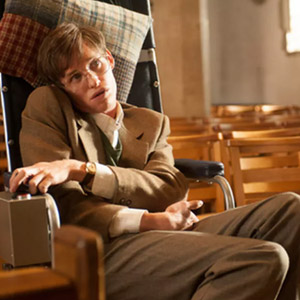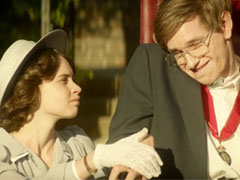Stephen Hawking (Eddie Redmayne) is a talented graduate student at Cambridge University who appears to lack direction in his studies when he meets Jane (Felicity Jones). Their romance is tested when he receives a diagnosis of motor neurone disease (MND).
The film looks of Stephen Hawing’s life is both sympathetic and inspirational, with excellent performances by the two leads who deserve their Academy Award nominations for best actor and best actress.
Whilst Hawking is probably the most famous astrophysicist in the world; the film focuses on the human condition rather than mathematics and science. It follows the young Stephen Hawking chaotically preparing his PhD despite his extraordinary ability, as he enjoys college life with his peers.


